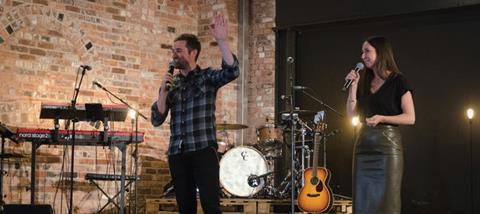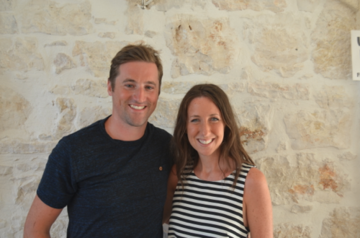
Tim Hughes is often credited for defining the sound of a generation’s Christian summer festivals. His breakthrough song, ‘Here I am to worship’ has become a modern worship classic, still sung across denominational boundaries nearly two decades since its release.
Tim succeeded Matt Redman as Soul Survivor Watford’s worship pastor before moving to London’s largest Anglican Church, Holy Trinity Brompton (HTB) in 2005 and becoming their director of worship. It was there that Tim and Rachel had their four children, Tim released a string of successful worship albums and co-founded Worship Central in order to equip worship leaders in local churches.
For those outside the London church circuit, all went silent from Hughes HQ. But the family home was anything but still. Tim joined a wave of evangelicals commencing training for ordination in the Church of England and was ordained at St Paul’s Cathedral in 2013.
The family continued to be based at HTB, preparing for something but unsure what the next season would hold. In 2015 the couple led a team to plant into Birmingham city centre. The move, driven by a vision to re-evangelise the UK and transform society, led them to a derelict gasworks.
The picture of reclaiming a historic power source for the city’s street lamps caught the couple’s imagination. Could this building be redefined as a place of praise, and shine new light on a darkened world?
From the outside, these sorts of projects often appear to be a done deal, set up to succeed by huge churches with big resources. But Tim recalls feeling utterly overwhelmed by the almost incomprehensible amount of money he needed to raise to make the building habitable – £1.2m.
“There was one particular moment when I was in the kitchen with Rach and I was having a low moment, saying, ‘This is too much, we’ve bitten off more than we can chew, I don’t think we’re up to this.’ I was down in the dumps.
“As I’m grumbling and moaning, my phone goes and it’s this guy saying: ‘Tim, we want to give you £25,000 towards the vision and the building.’ That was unbelievable. Obviously the money was fantastic but more than anything it was the timing. It was God saying, ‘I’ve got this, it’s not resting on your shoulders. Trust me and I will give you everything you need.’”
On top of testing their faith, the plant has also been a steep learning curve for the couple – settling their young children into a new city, forming a fledgling church community and learning how to lead together. The latter was the steepest curve of all, as Rachel acknowledged: “We don’t always agree!”
The couple are now two years into this exciting new journey. It’s not a long time in the world of church planting. But Gas Street is already a place of engagement with the arts and the new home of Worship Central. It is fast becoming a new light and a resource church for the Midlands.
Tim, most people know you as a worship leader. What was it that led you down the ordination route?
Tim: My dad’s a vicar. You always ask the question: will I do what my dad did? When I was a teenager I felt a strong call to the Church; I assumed that meant church leadership. Then almost as a surprise I ended up on the trajectory of writing songs, leading worship, travelling.
When Rachel and I were at HTB we just began dreaming, and the idea of being part of a community grounded in a city centre trying to make a difference became really exciting.
We began to feel more and more excited about leading together. And then an opportunity with St Mellitus came up and it just felt like, step-by step, God opening up the door to this new thing. And the wrestle for me: does stepping into leading a church mean letting go of leading worship? And actually, in a funny way, I feel I’m more alive in leading worship than I’ve ever felt.
Did you take a conscious step back from leading worship?
Tim: I lead worship less at church, because we’ve got so many leaders, and obviously we’re leading and preaching more. I probably tend to lead at festivals and different events.
I think arguably one of the great worship leaders in our country is a guy who can’t sing for toffee – Mike Pilavachi, who heads up Soul Survivor. He identified and raised up Matt Redman, myself and a whole bunch of others. Leading worship is way more than just playing the guitar or the piano and singing songs.
That’s one of our reasons to lead a church that really creates space for worship leaders to be raised up; people to really engage in worship; for creativity to flourish. We love to think that in years to come, all of these musicians and worship leaders and songs will have been earthed through what God is doing among us in Birmingham.
You have four young children – how has this transition to Birmingham been for you as a family?
Rachel: I think in many ways it’s been hugely exciting, because the kids are part of it. With them being so young (seven, six, four and two when we moved), they’re still flexible. They were at an age where moving city, moving schools, was a little bit easier.
Of course there were challenges but I was really struck by something that Judah Smith said when his dad first took on the church when he was a boy. His dad sat their family down and said, “Look, this isn’t me leading this church – we’re in this together as a family.”
Obviously there are times where it’s a juggle, it’s a challenge. We don’t always get it right as church leaders, we don’t always get it right as parents, but the big picture is as a family we’re on this journey together – we’ve been called as a family to do this.
I love that our kids get to see us doing the thing that we feel most called to, that we get the most joy out of. They see the highs and the lows but ultimately they get to see their parents fulfilling their calling, and I think that’s got to be a good thing.
We want them to love church family. Obviously we want them to love Jesus, and I think ultimately that’s going to happen by watching.
Tim: You don’t want to spend all your energy worrying about the spiritual nourishment of your congregation, and you don’t give any time for your kids. We feel really challenged by that.
Although you have worked together before, this is the first time you have co-led a congregation. How has this shift affected your relationship?
Tim: I think it’s really helped that we both started it together, rather than I’ve been doing it for a couple of years and Rachel’s joined me, or vice versa.
Rachel: Or even that we’re taking on an existing congregation who have been used to one male leader traditionally. We had this blank canvas which I think is God’s providence, provision and kindness, in the sense that we feel called to be together.
It’s not without its challenges, and our relationship’s pretty robust. We discuss things in quite passionate ways a lot of the time, but it’s because we care. The bottom line is, we really respect one another; we really value each other’s opinions and thoughts and approaches.
Tim: But I think also we’ve worked quite hard and been given some advice on having some kind of clarity on the lanes. So there are some areas where it’s Rachel’s domain and vice versa – that really helps. There are a few things where I might give a contradictory answer to someone on our team – that’s just unhelpful for everyone! So I think you do need to have a bit of clarity around who does what, and our different gift sets.
Rachel: Ultimately, in terms of our marriage, we’re both flourishing in what we’re doing, and so that’s a good thing. There are challenges – we don’t always agree. But I think when I was at home as a mum, I felt so called to that season – I love being with my children – but there was a part of me that felt dormant. I had this sense of calling that I knew was beyond that season. The fact that we both feel really fulfilled in what we’re doing is a blessing to our marriage and I think that then has a knock-on effect on how we lead together.
Rachel, have you considered ordination, since you are acting in quite a priestly role at Gas Street church?
Rachel: Yes, absolutely, and it’s timing. I would hate to be presumptuous and say that if I went down the track, I’d be automatically given the green light. It’s a process of discernment for the Church of England and for me. I would say that I’m in my own private place of discernment, which is probably more around timing than calling.
I feel absolutely called to church leadership. I also feel really called to the context that I’m in, which is Gas Street. I also feel really called to my family, and I saw what it took out of Tim when he was training. So yes, it’s definitely something that I’m thinking about, and I’m waiting for God to give that green light.
Do you see yourselves in Birmingham long-term, or do you think that God has made you to be church planters – to get a church to a point where it’s flourishing, and then moving on and planting?
Tim: Who knows! The phrase we have is ‘long-haul commitment’. Now, what is a long-haul commitment? I have no idea. When we started there you can feel this pressure of, “Let’s get on, let’s do this, let’s make it happen and go, go, go!” And actually someone said, “You know, you’re going to be here a long time; it doesn’t all have to happen.” Things take time – especially if you’re wanting to build something of value, build something of worth, of depth; that’s not a flash in the pan. You can gather a crowd quickly but to mobilise disciples takes time.
I think within that there’s the juggle and the discernment around Worship Central and the leading of that, and then other things we’re involved in – our connections with HTB, and there’s a lot of other national/international stuff that goes on. But for us, Birmingham feels front and centre.
Rachel: We love Birmingham. It gets bad press down south, but we love it. We love that Birmingham is a city on the move; that there’s so much happening there. And we feel excited that we’re part of that regeneration of the city, and that God is right at the centre of that. So we’re not in a hurry to leave Birmingham, that’s for sure. We love where we are; we feel really called here.
Click here for a free sample copy of Premier Christianity magazine






























